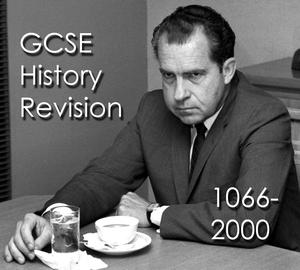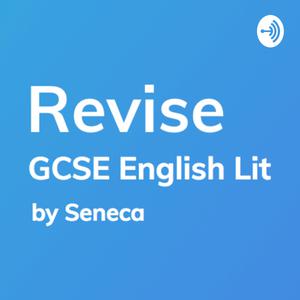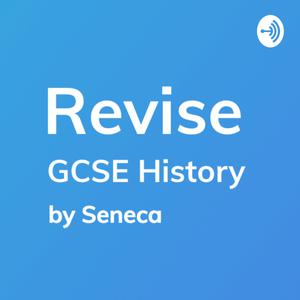
The GCSE History Revision Podcast
Mr W
Get ready for your History exam with the help of experts. Sort of experts. People who know things, at any rate.
- 43 minutes 56 secondsCastle Acre Priory - Norman England Site Study 2021
What can castle Acre tell us about the influence of the Cluniac Order on England? Who were the Cluniacs? And how did the complicated relationships between powerful individual men in this period impact on the revival of monasticism in England? How did monasteries impact on the political, economic and social fabric of this new, Norman state?
Buckle in, because it's a long one as we look at the site study for the 2021 exam and dig into the birth and development of Castle Acre Priory.
18 November 2021, 8:18 am - 12 minutes 43 secondsNorman England: Castle Acre Priory - Monasticism
The Historic Site Study for 2021 is Castle Acre Priory; but you can't understand why Castle Acre is so important without the context of monastisicm in Norman england. What is a monastery? Who do monks do?
The next episode will dig deeply into Castle Acre and how it links to the rest of Norman England.
16 November 2021, 6:50 pm - 13 minutes 41 secondsGermany: A golden age? Weimar Culture
Alongside the economic and political stability of the Stresemann period came a flowering of Weimar Culture. What did this look like, how did it impact our world today and how did it give the Nazis a wedge issue they could use to gain political traction with people in the countryside?
15 November 2021, 4:29 pm - 19 minutes 3 secondsGermany: A Golden Age? Stresemann and the 1920s
The Weimar Republic seemed on the brink of collapse in 1923 - yet it survived for another ten years. Was this miracle a true recovery or merely papering over the cracks? Join us as we look at the career of Gustav Stresemann and struggle to agree on a single pronunciantion for his name.
12 February 2021, 12:14 pm - 32 minutes 19 secondsNorman England: How Much Did Life Change?
1066 is regarded as a watershed moment when all of life in England changed. How far is this accurate? In this episode we look at the various ways that life changed in Norman England - and the ways in which is changed.
6 February 2021, 10:43 am - 53 minutes 52 secondsFilm Studies: Skyfall
In this special episode for GCSE Film Studies students we are joined by John Rain, host of SMERSHPOD
And author of THUNDERBOOK to talk about the underlying aesthetic of Bond films. Unsuprisingly, we also veer off the topic a bit and end up talking about Marvel films and why Infinity War is better than Endgame and why Film Studies students should watch JFK.
25 January 2021, 9:51 am - 21 minutes 29 secondsLeather and Steel: Young People in Nazi Germany
The Nazi state had very clear plans for the young men and women of Germany; these plans would be reflected in the changes to the education system and the creation of youth groups. In this episode we look at the interplay of these two factors and the overall impact of Nazi youth policies.
13 July 2020, 5:00 am - 44 minutes 25 secondsBONUS GCSE English Episode: AQA Anthology - Remains and the Light Brigade
For this episode we are joined by two colleagues from the English Department who are discussing two poems from the AQA anthology. Apologies for the sound quality - this episode was obviously recorded in lockdown.
9 July 2020, 12:32 pm - 16 minutes 16 secondsKinder, Küche, Kirche: Women in Nazi Germany
Germany was a totalitarian state - one where the government imposed control over every aspect of its citizens lives. One of the areas worth looking at in depth is now Nazi social policy effected women. What were the laws passed in relation to women and how was the role of women seen by the state - and how far did this role have the support of the german people?
7 July 2020, 8:39 pm - 53 minutes 1 secondThe White Tower: Norman England Historic Site Study
This is our bumepr episode on the Tower of London, the White Tower. William I's residence, symbol of power, refuge of last resort... why was it built? How did it function? How does it fit in with other castles built across England? Why was it white?
This is key episode for the 2021 exam as there will be a 16 mark essay question on this.
1 July 2020, 9:14 am - 23 minutes 45 secondsGermany Bonus Episode: The SA
In this episode we look at the rise and fall of the SA. How important was it to early Nazi success and what impact did it have on their electoral victories - and at what point did it become a hinderance rather than a help?
We are joined for this episode by Stephen Graham of the Faces of Fascism podcast.
4 May 2020, 12:02 pm - More Episodes? Get the App
Your feedback is valuable to us. Should you encounter any bugs, glitches, lack of functionality or other problems, please email us on [email protected] or join Moon.FM Telegram Group where you can talk directly to the dev team who are happy to answer any queries.
 GCSE Science Podcast
GCSE Science Podcast
 GCSE English RevisionPod
GCSE English RevisionPod
 Revise - GCSE English Literature Revision
Revise - GCSE English Literature Revision
 Revise - GCSE History Revision
Revise - GCSE History Revision
 GCSE and IGCSE History Revision Guides: Mr Allsop History
GCSE and IGCSE History Revision Guides: Mr Allsop History
 Mr Bruff Podcast
Mr Bruff Podcast